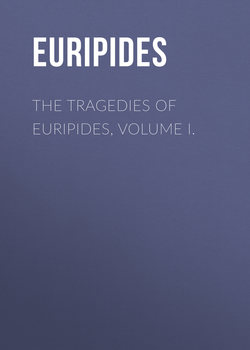Читать книгу The Tragedies of Euripides, Volume I. - Euripides - Страница 20
ORESTES
ORESTES
ELECTRA. HELEN
ОглавлениеHEL. O daughter of Clytæmnestra and Agamemnon, O Electra, thou that hast remained a virgin a long time. How are ye, O wretched woman, both you, and your brother, the wretched Orestes (he was the murderer of his mother)? For by thy converse I am not polluted, transferring, as I do, the blame to Phœbus. And yet I groan the death of Clytæmnestra, whom, after that I sailed to Troy, (how did I sail, urged by the maddening fate of the Gods!) I saw not, but of her bereft I lament my fortune.
ELEC. Helen, why should I inform thee of things thou seest thyself here present, the race of Agamemnon in calamities. I indeed sleepless sit companion to the wretched corse, (for he is a corse, in that he breathes so little,) but at his fortune I murmur not. But thou a happy woman, and thy husband a happy man, have come to us, who fare most wretchedly.
HEL. But what length of time has he been lying on his couch?
ELEC. Ever since he shed his parent's blood.
HEL. Oh wretched, and his mother too, that thus she perished!
ELEC. These things are thus, so that he is unable to speak for misery.
HEL. By the Gods wilt thou oblige me in a thing, O virgin?
ELEC. As far as I am permitted by the little leisure I have from watching by my brother.
HEL. Wilt thou go to the tomb of my sister?
ELEC. My mother's tomb dost thou desire? wherefore?
HEL. Bearing the first offerings of my hair, and my libations.
ELEC. But is it not lawful for thee to go to the tomb of thy friends?
HEL. No, for I am ashamed to show myself among the Argives.
ELEC. Late art thou discreet, then formerly leaving thine home disgracefully.
HEL. True hast thou spoken, but thou speakest not pleasantly to me.
ELEC. But what shame possesses thee among the Myceneans?
HEL. I fear the fathers of those who are dead under Ilium.
ELEC. For this is a dreadful thing; and at Argos thou art declaimed against by every one's mouth.
HEL. Do thou then grant me this favor, and free me from this fear.
ELEC. I can not look upon the tomb of my mother.
HEL. And yet it is disgraceful for servants to bear these.
ELEC. But why not send thy daughter Hermione?
HEL. It is not well for virgins to go among the crowd.
ELEC. And yet she might repay the dead the care of her education.
HEL. Right hast thou spoken, and I obey thee, O virgin, and I will send my daughter, for thou sayest well. Come forth, my child Hermione, before the house, and take these libations in thine hand, and my hair, and, going to the tomb of Clytæmnestra, leave there this mixture of milk and honey, and the froth of wine, and standing on the summit of the mound, say thus: "Helen, thy sister, presents thee with these libations, in fear herself to approach thy tomb, and afraid of the populace of Argos: " and bid her hold kind intentions toward me, and thyself, and my husband, and toward these two miserable persons whom the God has destroyed. But promise all the offerings to the manes, whatever it is fitting that I should perform for a sister. Go, my child, hasten, and when thou hast offered the libations at the tomb, remember to return back as speedily as possible.
ELEC. [alone] O Nature, what a great evil art thou among men, and the safeguard of those who possess thee, with virtue! For see, how she has shorn off the extremities of her hair, in order to preserve her beauty; but she is the same woman she always was. May the Gods detest thee, for that thou hast destroyed me, and this man, and the whole state of Greece: oh wretch that I am! But my dear friends that accompany me in my lamentations are again present; perhaps they will disturb the sleeper from his slumber, and will melt my eyes in tears when I behold my brother raving.
